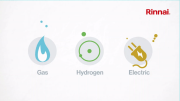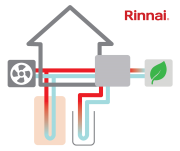Hydrogen has some specific advantages over fossil fuels. Hydrogen produces zero carbon emissions and can be produced utilizing renewable resources such as wind and solar power. Hydrogen usage can assist in creating healthier local air quality and assist in the necessary reduction of UK fossil fuel reliance.
As global economies continue to identify and incorporate clean and sustainable energies into respective national options, hydrogen has emerged as a potential source of energy capable of decarbonising and delivering power to domestic and commercial applications.
Despite the Whitby and Redcar Hydrogen Village Trial cancellations the UK government has taken a strategic policy decision to support hydrogen gas blending of up to 20%.
But many people ask: Is hydrogen heating really the safe and sustainable choice for your DHW and commercial heating projects?
In order to achieve the lowest possible carbon outputs on a national, continental and global scale there will, inevitably, be significant changes to infrastructure – in such arenas as generation and distribution. These changes will take decades to implement. What is also inevitable is that shared technology-in appliances, fuels, and their variants – will end a reliance on the mass production of a major and singular energy source. Hydrogen, along with all other fuels, could play a major role.
 Hydrogen has some specific advantages over fossil fuels. Hydrogen produces zero carbon emissions and can be produced utilizing renewable resources such as wind and solar power. Hydrogen usage can assist in creating healthier local air quality and assist in the necessary reduction of UK fossil fuel reliance.
Hydrogen has some specific advantages over fossil fuels. Hydrogen produces zero carbon emissions and can be produced utilizing renewable resources such as wind and solar power. Hydrogen usage can assist in creating healthier local air quality and assist in the necessary reduction of UK fossil fuel reliance.
However, there are some real and perceived safety issues that surround hydrogen’s mass deployment. Hydrogen is highly flammable and requires careful handling and storage, as do all domestic and commercially used gases worldwide.
Additionally, construction of hydrogen infrastructure is currently incomplete and could demand existing in-building pipework to be connected to existing commercial heating systems, meaning hydrogen may not be accessible or cost-effective for every building.
Due to concerns regarding hydrogen usage we move to explore the safety aspects of hydrogen heating.
Understanding the safety of hydrogen commercial heating
There are numerous reports that both support safety risks and advantages associated with hydrogen heating. The UK government will decide on the feasibility of hydrogen heating in 2026, whilst the HSE (Health and Safety Executive) will provide an authoritative and impartial report on all safety aspects concerning 100% hydrogen distribution across Great Britain.
The support provided by the HSE will feed into Government policy decisions in 2026 based upon the HSE’s 2023 call for evidence on hydrogen heating. The HSE will also work alongside OFGEM, gas operators and the Department for Energy Security and Net Zero regarding potential neighbourhood hydrogen heating trials and evidence supporting hydrogen usage across other regions in the UK.
The primary focus of the HSE is to ensure that network operators possess a full understanding of all risks associated with hydrogen heating, storage and distribution. The HSE has also set up a future hydrogen regulatory workstream to assess the suitability of HSE enforced regulations. This work will consider the regulatory and legislative changes that will be required to enable a potential larger roll out of 100% hydrogen for heating.
The HSE will also develop options for any necessary amendments to the health and safety regulatory frameworks. This will contribute to potential policy options for future safety regulation in the final quarter of 2024, followed by written advice to the Department for Energy Security and Net Zero in March 2025 ahead of the final decision on hydrogen for heating in 2026. Therefore, if greater volumes of hydrogen do enter the UK gas distribution network it will only be after a complete safety review.
 Case studies: Successful implementation of hydrogen heating and hydrogen DHW
Case studies: Successful implementation of hydrogen heating and hydrogen DHW
Two examples of hydrogen implementation case studies will be used to understand the practical applications and benefits of hydrogen heating. These case studies demonstrate that hydrogen heating is not just a theoretical concept, but a practical and viable solution for reducing carbon emissions and transitioning to a more sustainable energy system.
Case Study 1: The Netherlands – www.hystock.nl
The Netherlands has taken a leading role in exploring hydrogen heating. The HyStock initiative aims to produce and store hydrogen using excess renewable energy. Stored hydrogen is used to provide heat and power during periods of high demand reducing national reliance on fossil fuels.
Case Study 2: Japan
Japan can also be considered a global leader in hydrogen exploration as a sustainable heating solution. The city of Fukuoka has launched a pilot project in which renewably generated hydrogen provides properties both heating and hot water. The project has shown promising results in terms of reducing carbon emissions and increasing energy efficiency.
Conclusion:
Hydrogen heating has potential to be a safe and sustainable energy option, however a final decision will only be made after a robust and detailed safety review is presented alongside a comprehensive structure of regulatory framework. Hydrogen offers environmental benefits such as zero carbon emissions and renewable sustainability that reduces fossil fuel utilization, however safety considerations and limited infrastructure are areas that require further development and study.
For details on Hydrogen developments at Rinnai UK visit Hydrogen Sustainability :: Rinnai UK (rinnai-uk.co.uk)
All Rinnai I2HY20 water heaters are certified for use of 20% blended natural gas and hydrogen and come with market leading warranties for more information call us 0300 373 0660 or leave your details via the following form today,
Help me choose a product :: Rinnai UK (rinnai-uk.co.uk)
Useful resources
https://www.nwhydrogenalliance.co.uk/
https://hydrogen-uk.org/
Visit www.rinnai-uk.co.uk
Or email engineer@rinaiuk.com